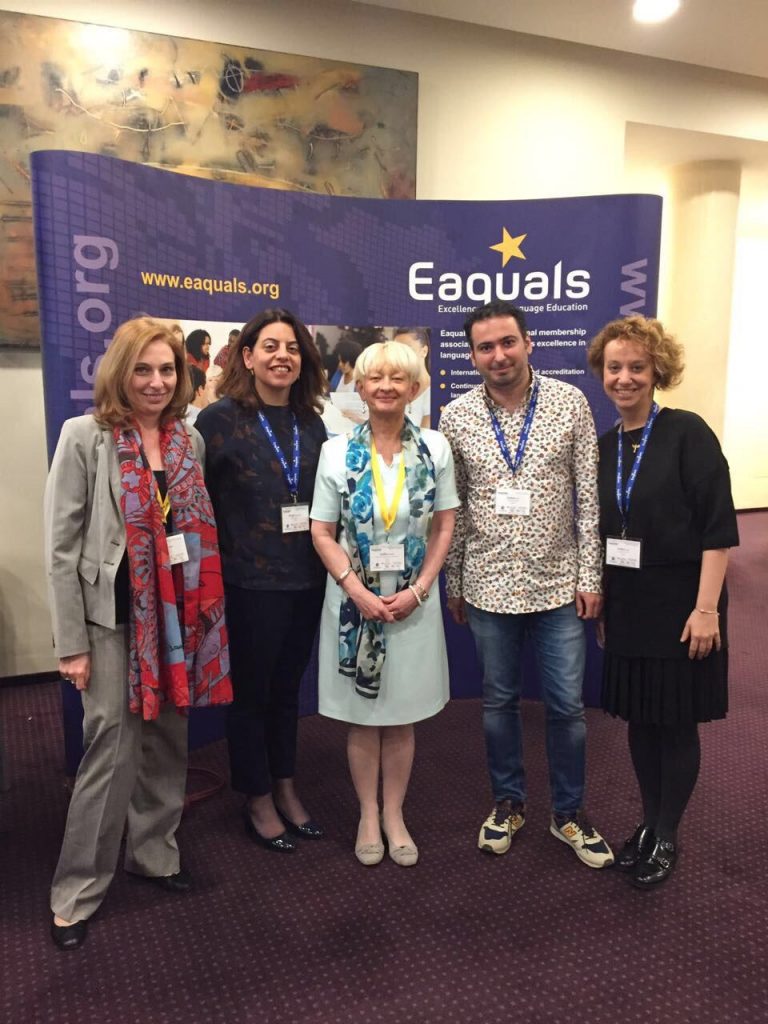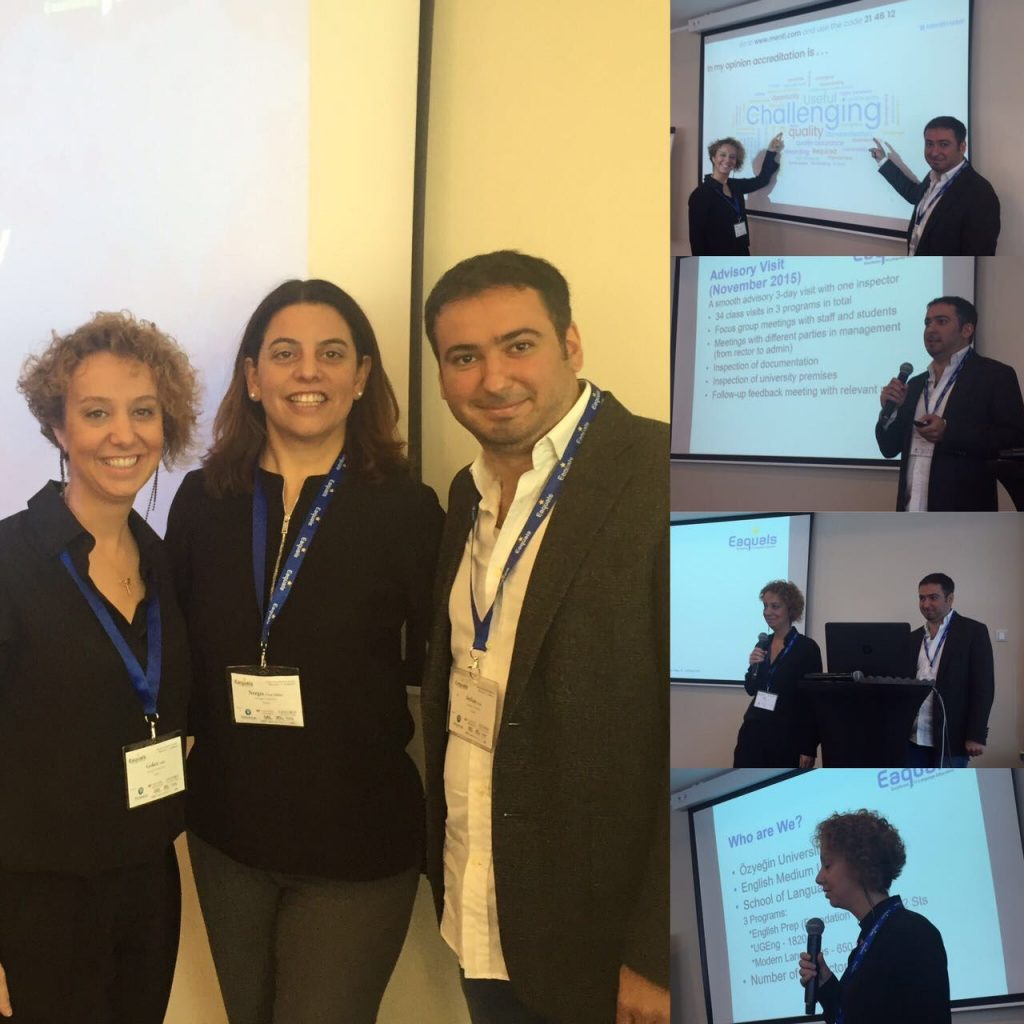Reflections on EAQUALS International Conference 2017

- Conference Title: Eaquals International Conference 2017
- Presentation Title: An Accreditation Journey
- Presenter(s): Gökçe Ünlü, Serkan Aras
- Brief information about the conference (location, the theme(s), keynote speaker(s), the length, etc.):
27 – 29 April 2017 in Riga, Latvia
The 3-day event provided a rich programme of professional development for centre owners and directors as well as academic staff.
https://www.eaquals.org/event/riga/
Conference Themes:
- Language Teaching and Learning
- Course Design and Assessment
- New Trends and Innovation
- Staff Development
- Managing for Quality
- Business and Marketing Management
Keynote speakers
- Duncan Foord
- Marie Delaney
- Russell Stannard
- Jackie Kassteen
- Brian North

- Brief information about our presentation:
The process of getting accredited can be perceived as a burden by institutions; however, the institutions on accreditation journey could turn this challenge into an opportunity. In our case, this process became a fruitful experience for Özyeğin University, and in this presentation, we shared our rewarding journey of EAQUALS accreditation: how it started, proceeded and reached the happy ending. It also provided some practical tips for schools aiming to turn accreditation into a developmental process. The presentation started with the process before accreditation: the motives leading us to prefer EAQUALS and how we identified our needs and actions. The second part of the presentation showed the actions taken through self-assessment process in which we were able to identify where we were and where we were heading to. The last part was devoted to the details of the process following the advisory visit and the inspection.
You can reach the slides of our presentation from the link below:
https://www.eaquals.org/resources/serkan-aras-gokce-unlu-an-accreditation-journey/
- “Highlights from Conference”
EAQUALS Annual General Meeting
For the first time as a member of EAQUALS, Nergis Uyan attended the EAQUALS Annual General Meeting which was held on Friday 28th April.
The new members were introduced and welcomed in the meeting. Different members of EAQUALS Board presented the below reports;
- Treasurer’s Report for 2016 and proposed fees 2018,
- 2016 Trustees Report.
- Report from the Executive Director,
- Report from the Director of Accreditation
Election of Trustees was also a part of the meeting and all the members voted for the selection of EAQUALS board members and the results were announced at the end of the meeting.
Discussion of EAQUALS’ Policy on Publishable Statements was another agenda item of the meeting that gave all the members the opportunity to discuss and share their views on the options presented.
Day 1
Duncan Foord gave a whole-day management training on ‘Developing Your Team’ to all conference participants.
Here is the outline of his training:
“In this one day workshop we will look at three areas relating to building and maintaining effective teams in organizations.
• We will work on “teamthink”, how to create better meetings and arrive at better decision making by encouraging people to think independently and creatively.
• We will learn about and practice the fine art of delegating within the team to get people contributing from their strengths.
• We will consider issues around motivation and rewards for teams and individual team members.
The workshop will be of interest to all language education professionals including teachers, centre managers and owners.”
Day 2 and 3
In total there were 51 sessions apart from the management training by Duncan Foord.
In addition to three plenaries, we were able to attend 13 sessions choosing from a range of elective sessions.
Transitions in the Life of a Teacher by Rod Bolitho
“This talk looks at professional development from a number of angles and pinpoints some of the challenges that language teachers face as their career unfolds over time. The first transition, from being a learner to becoming a teacher is possibly the most difficult of all, and I will examine some ways of dealing with it. But I will also discuss later transitions, most of which are optional in nature: moving into training, taking on new responsibilities, becoming a manager, embarking on research, writing materials and even retiring (!!) and will consider what each of these options opens up and closes down in career terms, with reference to some individual case studies. I will also consider the value of the professional and academic qualifications that teachers often go for, as well as the place of CPD frameworks in mapping out a teachers’ career pathway.”
Supporting and managing language teachers: challenges & insights by Tim Herdon, Brian North, Richard Rossner
“This workshop will focus on a key aspect of the role of academic managers and coordinators: the support and management of the teachers they work with. This role spans a range of management activities that are essential to the quality and effectiveness of an institution’s work, for example orientating teachers to the courses provided by the institution, including the syllabuses and resources; overseeing and supporting teachers’ ongoing professional development; and managing teachers’ performance in and outside the classroom.”
Inclusion of all – is it possible? Myths and realities. By Marie Delaney
“This workshop will continue the themes of the plenary speech and will look in more depth at the classroom teaching issues when developing inclusive classrooms. It will look in particular at ways of dealing with challenging behaviour in relation to students with special educational needs. Often behaviour is the only indicator that a learner is having difficulty with learning.
. We will look in particular at how behaviour can be a sign of
• working memory difficulties
• hearing impairment
• dyslexia
• tracking and attention difficulties
• communication difficulties
• social difficulties
• trauma and loss in early years
We will look at some strategies which can help teachers in general to manage these learners in class.”
Bringing the Eaquals Framework for Language Teacher Training and Development to Life by Chris Farrell
“Within the realm of teacher development, the issue of teacher competencies is a crucial consideration. Both the teacher and the institution should have a clear idea of what each individual teacher’s strengths and weaknesses are in order to best prepare for further development. The Eaquals Framework for Language Teaching and Training is an excellent document which lays out these competencies clearly. This workshop will seek to raise awareness of how this framework can be used in a practical manner, with some case studies of usage, and some practical advice for attendees. In addition, it will look at the role of teacher reflection based on the Framework in the development of teaching and teachers. In summary, it will attempt to bring this document to life for many who may be unfamiliar with it.”
How will a language school in 2025 differ from a language school of today? by Justin Quinn
“I will be looking at how a school will be teaching in 2025 & the types of students that will be learning the language.
How a school will attract these students and where will the school get the materials to teach the students of tomorrow / the role of the LTO in training its trainers to diversify from its traditional language training model
I will also be looking at the student and how their needs and requirements will have changed. And what will they be looking for in a Language Training Organisation.”
Plenary: 21st Century Skills – Going Beyond Language Learning by Jacqueline Kassteen
“As the pace of technological change quickens and the world undergoes economic, political and cultural shifts, human behaviour is evolving, affecting both our personal and professional lives. Moreover, job functions are shifting, directly impacting the skills young people need to master now in order to excel in the future. Today, more than ever, schools must broaden their educational offering to encompass much more than language instruction. The real question is, how will your business model adapt to these new requirements?”

Leave a Reply